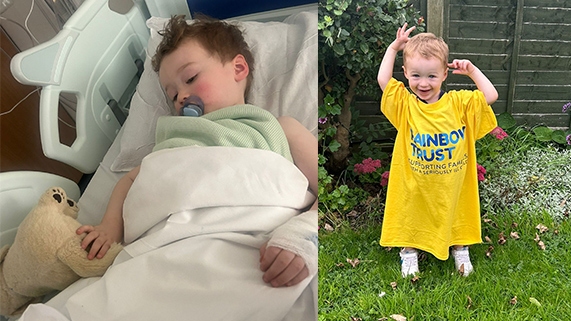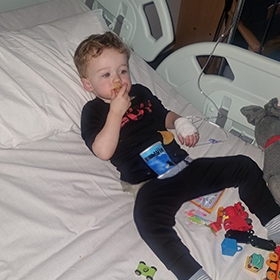On Boxing Day, 2022, two-year-old Tommy came down with a temperature and began struggling to walk. His mum, Leah, explained how out of character his behaviour was:
‘He was staggering around. It was like he was on a cruise ship. He kept falling over and just couldn’t balance unsupported.’
His parents, Leah and Michael, took Tommy to the doctors the next day and were then sent to their local hospital. Doctors there struggled to diagnose Tommy, as the various scans and tests they performed all came back as clear, but his symptoms persisted.
‘It was really difficult because his condition is so rare. Doctors went down the route of brain MRI and CT scans, but everything was coming back clear. They originally diagnosed him with Cerebellar Ataxia. He’d tested positive for flu whilst in hospital so it was suggested he could maybe have had some swelling around the brain as a result of that. After a few days we were sent home but his symptoms never fully went away. I knew something wasn’t right.’
Later in January 2023, the family were referred to the Royal Victoria Infirmary Hospital (RVI) where the doctors were incredibly thorough and eventually diagnosed Tommy with a rare condition called Opsoclonus Myoclonus Syndrome (OMS), which is caused by a Neuroblastoma (tumour) near his spine.
‘We really wanted a diagnosis because there was obviously something wrong with him. I’m a bit of a worrier and always prepared for the worst-case-scenario, but I didn’t think it would be something as bad as that. Not a tumour!’
Although Tommy’s tumour is small, it is located on a blood vessel so it is not being removed. At present, Tommy’s parents were told by their oncology consultant that it would be more risky to operate than to use the ‘watch and wait’ approach. Tommy was having an MRI scan on the tumour every three months to make sure there are no changes, but this has recently been increased to every six months due to its stability.
The symptoms Tommy experiences are a result of the OMS, which is secondary to the tumour. He is also on regular steroids for his symptoms, however, this makes his behaviour extremely challenging.
‘The OMS heavily affects his behaviour but we’ve got to a good place at the moment with his mobility and movement. He can now walk and feed himself, all the things he lost the ability to do at the beginning but his condition causes these rage attacks that are very challenging for us to manage. Just to go out and do normal family things is really difficult. You feel on eggshells all of the time, waiting for the next tantrum.’

